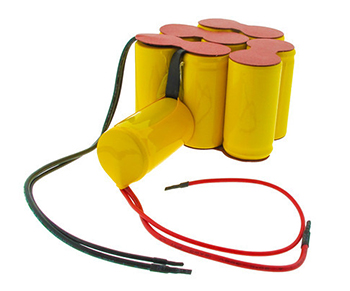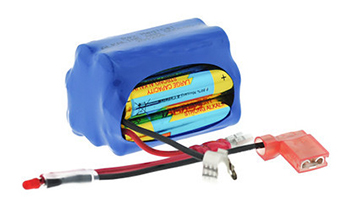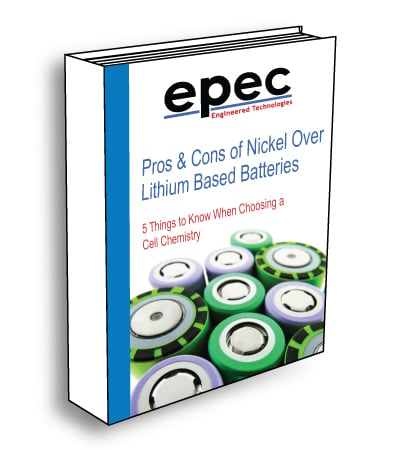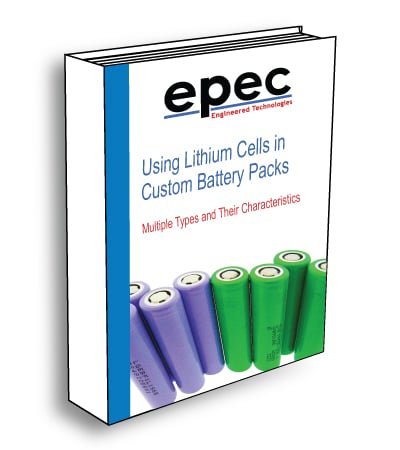
Nickel Battery Technologies Nickel-Cadmium & Nickel-Metal Hydride
Nickel-based battery packs, including Nickel-Cadmium (NiCad) and Nickel-Metal Hydride (NiMH), offer distinct advantages for custom energy storage solutions. NiCad excels in high-rate discharge and durability, while NiMH provides higher energy density and environmental benefits. Each chemistry has trade-offs in cycle life, memory effect, and self-discharge, making selection dependent on application-specific needs.
See our pros and cons of nickel over lithium based batteries for more information regarding the differences in these battery technology.
At a Glance: NiCad vs NiMH Battery Packs
- NiCad: Durable, high discharge rates, wide temperature range; affected by memory effect and environmental concerns due to cadmium.
- NiMH: Higher energy density, environmentally friendly, robust under charge/discharge stress; suffers from higher self-discharge and storage degradation.
Specifications Comparison
| Parameter | NiCad | NiMH | Units |
|---|---|---|---|
| Cell Voltage | 1.2 | 1.2 | V |
| Specific Energy Density | — | ~70 | Wh/kg |
| Volumetric Energy Density | — | ~300 | Wh/L |
| Cycle Life | — | Up to 3000 | cycles |
| Discharge Rate | Up to 10C (short periods) | Up to 1C | C-rate |
| Operating Temperature | Up to 70 | Wide Range | °C |
 NiCad Battery Pack for Commercial Lighting Application
NiCad Battery Pack for Commercial Lighting Application
Overview of Nickel-Based Battery Chemistries
Nickel-based batteries are available in multiple chemistries, with NiCad and NiMH being the most widely used. While no single chemistry offers a perfect solution, Epec focuses on these two due to their proven performance across commercial and industrial applications.
NiCad Battery Pack Characteristics
Nickel-Cadmium (NiCad) batteries use nickel oxide hydroxide and cadmium electrodes. Available in sealed and vented formats, NiCad packs offer:
- Low internal resistance
- High-rate charge/discharge (up to 10C)
- Flat discharge profile
- Deep discharge tolerance
- Operation in temperatures up to 70°C
Limitations include susceptibility to memory effect, overcharge damage, and environmental concerns due to cadmium content.
NiMH Battery Pack Characteristics
Nickel-Metal Hydride (NiMH) batteries replace cadmium with a hydrogen-absorbing alloy. They share the nickel oxyhydroxide positive electrode with NiCad but offer:
- 2-3x capacity of equivalent NiCad cells
- ~70 Wh/kg specific energy
- ~300 Wh/L volumetric energy
- Up to 3000 cycle life
- Deep discharge capability (80-100% DOD)
- Resistance to overcharge/discharge
- Environmentally safe (no cadmium, mercury, or lead)
Challenges include high self-discharge, memory effect (less severe than NiCad), and performance degradation during long-term storage.
 Ni-MH Battery Pack for a Medical Device
Ni-MH Battery Pack for a Medical Device
Battery Management and Safety
NiMH cells require safety vents to manage gas generation. Though robust, they benefit from reconditioning (charge/discharge cycles) after extended storage. NiCad cells also need careful charge control to avoid damage. Both chemistries simplify BMS requirements compared to lithium systems.
Energy Storage Solutions Provider
We manufacture cutting-edge products, combining precision engineering with extensive applications expertise to assist customers in integrating energy storage solutions into their products. Epec Engineered Technologies has the proven technology and integration expertise to bring your applications from conception to commercialization.
To learn more about nickel battery technologies, see our blog post on the shelf life of a rechargeable NiMH battery.
Frequently Asked Questions
Quick Links
- What does NiCad stand for?
- What are the main advantages of NiCad batteries?
- What are the drawbacks of NiCad batteries?
- How does NiMH compare to NiCad in energy capacity?
- Do NiMH batteries suffer from memory effects?
- Are NiMH batteries environmentally safer than NiCad?
- Can NiMH batteries be deep cycled?
What does NiCad stand for?
NiCad is a registered trademark of SAFT Corporation and is commonly used to refer to nickel-cadmium batteries. The abbreviation NiCd comes from the chemical symbols for nickel (Ni) and cadmium (Cd), which are the two primary elements in the battery’s composition. These batteries have been widely used for decades in applications requiring durability and high discharge rates. While the term NiCad is often used generically, it technically refers to a specific brand, whereas NiCd is the correct chemical designation.
What are the main advantages of NiCad batteries?
NiCad batteries are known for their low internal resistance, which allows them to deliver high discharge currents efficiently. They can tolerate deep discharge cycles without significant damage, making them suitable for demanding applications. Another advantage is their ability to operate across a wide temperature range, from extreme cold to high heat, without major performance loss. These characteristics make NiCad batteries reliable for power tools, emergency systems, and other high-drain environments.
What are the drawbacks of NiCad batteries?
Despite their strengths, NiCad batteries have notable disadvantages. They are susceptible to memory effect, which can reduce capacity if the battery is repeatedly recharged before being fully discharged. Overcharging can also damage the cells, requiring careful charge management. Additionally, cadmium is a toxic heavy metal, making disposal and recycling environmentally challenging and subject to strict regulations. These drawbacks have led to a decline in NiCad use in favor of safer, higher-capacity alternatives.
How does NiMH compare to NiCad in energy capacity?
Nickel-metal hydride (NiMH) batteries typically offer two to three times the energy capacity of equivalent NiCad cells. This means devices can run longer on a single charge without increasing battery size significantly. NiMH technology also provides improved energy density, making it a better choice for applications where weight and space are critical. However, while NiMH excels in capacity, it may have slightly higher internal resistance compared to NiCad, which can affect performance in very high-drain scenarios.
Do NiMH batteries suffer from memory effects?
Yes, NiMH batteries can experience memory effect, but it is far less severe than in NiCad batteries. This phenomenon occurs when a battery is repeatedly charged before being fully discharged, leading to reduced usable capacity over time. Fortunately, the effect can often be mitigated by performing periodic full discharge and recharge cycles, known as reconditioning. Proper charging practices and modern smart chargers also help minimize this issue, making NiMH more user-friendly than NiCad.
Are NiMH batteries environmentally safer than NiCad?
NiMH batteries are considered much safer for the environment because they do not contain cadmium, mercury, or lead. This makes disposal and recycling less hazardous and subject to fewer regulatory restrictions. Their chemistry is generally regarded as non-toxic, reducing the environmental impact compared to NiCad. As a result, NiMH has become a preferred choice for consumer electronics and other applications where sustainability is a priority.
Can NiMH batteries be deep cycled?
Yes, NiMH batteries can tolerate deep discharge cycles, typically up to 80–100% depth of discharge (DOD), without significant damage. This capability allows them to deliver consistent performance in applications that require frequent full discharges, such as portable electronics or hybrid vehicles. While deep cycling can shorten the lifespan of some battery types, NiMH handles it well when managed properly. This makes them versatile and reliable for a wide range of demanding uses.
Are Nickel-Based Batteries Your Best Option?
Optimize your energy storage with nickel-based batteries. Choose between NiCad and NiMH for your specific needs. Get started with a custom quote today.
Request a Quote Request Design Support Request More Information









